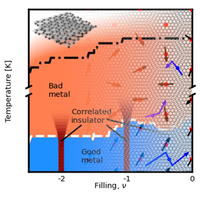Dynamical Correlations and Order in Magic-Angle Twisted Bilayer Graphene
IF 11.6
1区 物理与天体物理
Q1 PHYSICS, MULTIDISCIPLINARY
引用次数: 0
Abstract
The interplay of dynamical correlations and electronic ordering is pivotal in shaping phase diagrams of correlated quantum materials. In magic-angle twisted bilayer graphene, transport, thermodynamic, and spectroscopic experiments pinpoint a competition between distinct low-energy states with and without electronic order, as well as between localized and delocalized charge carriers. In this study, we utilize dynamical mean-field theory on the topological heavy fermion model of twisted bilayer graphene to investigate the emergence of electronic correlations and long-range order in the absence of strain. We contrast moment formation, Kondo screening, and ordering on a temperature basis and explain the nature of emergent correlated states based on three central phenomena: (i) the formation of local spin and valley isospin moments around 100 K, (ii) the ordering of the local isospin moments around 10 K preempting Kondo screening, and (iii) a cascadic redistribution of charge between localized and delocalized electronic states upon doping. At integer fillings, we find that low-energy spectral weight is depleted in the symmetric phase, while we find insulating states with gaps enhanced by exchange coupling in the zero-strain ordered phases. Doping away from integer filling results in distinct metallic states: a “bad metal” above the ordering temperature, where scattering off the disordered local moments suppresses electronic coherence, and a “good metal” in the ordered states with coherence of quasiparticles facilitated by isospin order. This finding reveals coherence from order as the microscopic mechanism behind the Pomeranchuk effect observed experimentally by Rozen et al. [Nature (London) 592, 214 (2021)] and by Saito et al. [Nature (London) 592, 220 (2021)]. Upon doping, there is a periodic charge reshuffling between localized and delocalized electronic orbitals leading to cascades of doping-induced Lifshitz transitions, local spectral weight redistributions, and periodic variations of the electronic compressibility ranging from nearly incompressible to negative. Our findings highlight the essential role of charge transfer, hybridization, and ordering in shaping the electronic excitations and thermodynamic properties in twisted bilayer graphene and provide a unified understanding of the most puzzling aspects of scanning tunneling spectroscopy, transport, and compressibility experiments.

魔角扭曲双层石墨烯中的动态相关性和有序性
动力学相关性和电子有序性的相互作用在形成相关量子材料的相图方面起着关键作用。在魔角扭曲双层石墨烯中,输运、热力学和光谱实验指出了有电子有序和无电子有序的不同低能态之间的竞争,以及局部电荷载流子和非局部电荷载流子之间的竞争。在本研究中,我们利用扭曲双层石墨烯拓扑重费米子模型的动态均场理论,研究了在无应变情况下电子关联和长程有序的出现。我们在温度基础上对比了矩的形成、Kondo 筛选和有序化,并根据三个核心现象解释了出现的相关态的性质:(i) 100 K 左右形成的局部自旋和谷等空间矩;(ii) 10 K 左右局部等空间矩的有序化抢先了 Kondo 筛选;(iii) 掺杂后局部和非局部电子态之间电荷的级联再分布。在整数填充时,我们发现对称相中的低能谱权重被耗尽,而在零应变有序相中,我们发现了间隙通过交换耦合而增强的绝缘态。远离整数填充的掺杂会导致截然不同的金属态:在有序温度之上的 "坏金属",无序局部矩的散射抑制了电子相干性;而在有序态中的 "好金属",等空间有序促进了准粒子的相干性。这一发现揭示了 Rozen 等人[《自然》(伦敦)592, 214 (2021)]和 Saito 等人[《自然》(伦敦)592, 220 (2021)]在实验中观察到的波美兰丘克效应背后的微观机制--有序相干性。掺杂后,局部电子轨道和非局部电子轨道之间会出现周期性的电荷重组,从而导致掺杂诱导的级联利夫希茨跃迁、局部光谱重量重新分布以及电子可压缩性的周期性变化(从几乎不可压缩到负可压缩)。我们的发现凸显了电荷转移、杂化和有序化在形成扭曲双层石墨烯的电子激发和热力学性质中的重要作用,并为扫描隧道光谱、传输和可压缩性实验中最令人困惑的方面提供了统一的理解。
本文章由计算机程序翻译,如有差异,请以英文原文为准。
求助全文
约1分钟内获得全文
求助全文
来源期刊

Physical Review X
PHYSICS, MULTIDISCIPLINARY-
CiteScore
24.60
自引率
1.60%
发文量
197
审稿时长
3 months
期刊介绍:
Physical Review X (PRX) stands as an exclusively online, fully open-access journal, emphasizing innovation, quality, and enduring impact in the scientific content it disseminates. Devoted to showcasing a curated selection of papers from pure, applied, and interdisciplinary physics, PRX aims to feature work with the potential to shape current and future research while leaving a lasting and profound impact in their respective fields. Encompassing the entire spectrum of physics subject areas, PRX places a special focus on groundbreaking interdisciplinary research with broad-reaching influence.
 求助内容:
求助内容: 应助结果提醒方式:
应助结果提醒方式:


